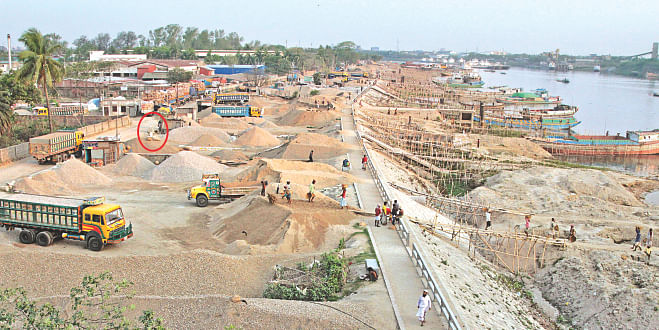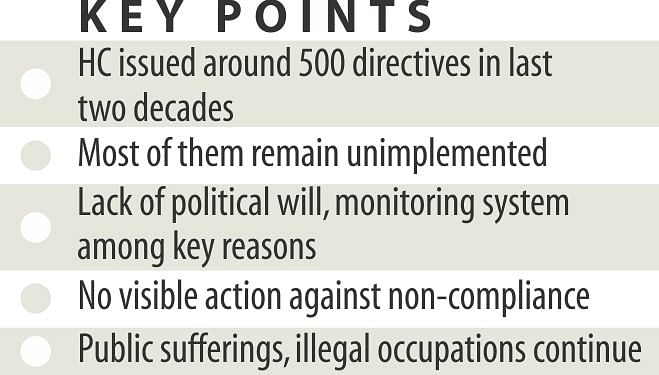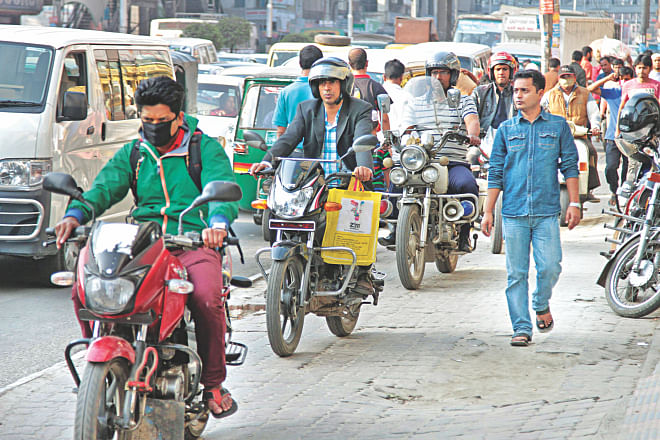HC orders ignored

Five years ago, the High Court ordered the government to dredge and clean the four rivers around Dhaka and remove illegal structures from their banks, in efforts to save these lifelines of the capital.
A series of government actions followed, but not for long. The consequences have been terrible -- the rivers continue to be choked by grabbers and their waters have become even more toxic.
This is just one example of how HC directives in public interest have been disregarded and, sometimes, forgotten both by the court and the government authorities, thanks to the absence of a monitoring body.
Over the past two decades, around 500 such directives have been issued. Most of the important ones, however, have not been implemented.

For instance, the HC in March 2012 asked the authorities to stop bikers from using footpaths in the capital to ensure safety of the pedestrians. But nobody seemed to have cared. Most of the city's footpaths have now become "bike-paths," which are used even by law enforcers.
In June that year, the court slapped a ban on private CNG-run auto-rickshaws plying the Dhaka streets as commercial vehicles illegally. This too fell on deaf ears and a significant number of them -- ash, grey and silver in colours -- still operate as commercial vehicles.
Even the Supreme Court authorities did not act on a 2001 HC directive for setting up a cell to monitor the implementation of its orders issued upon public interest litigations (PILs).
Legal experts say the reluctance of the authorities, lack of monitoring systems and resources and flaws in some directives are the main reasons behind this.
“These directives are often sweeping and oversimplified and almost impossible to implement. And the resources required to implement these are often so huge that the government may not be in a position to execute those,” said eminent jurist Shahdeen Malik.
Bureaucratic inefficiency and vested interests are also to be blamed for their non-implementation, he told this correspondent.
Khurshid Alam Khan, editor of Dhaka Law Report, held bureaucratic tangles and lack of government monitoring responsible for this.
The government can set up a monitoring cell to oversee the execution of the HC directives, he said, adding that the court might also ask for compliance reports on the orders.
Manzill Murshid, president of Human Rights and Peace for Bangladesh, which has moved more than 150 public interest litigations before the HC since 2007, thinks a lack of will on the part of the administration in most cases is to be blamed for the non-execution of the directives.
Most of the HC directives issued to safeguard people's interests and rights since the independence have been ignored.
"It happens as the field-level officials show little respect for the law, and also because of the pressure from the influential people whose interests are hurt by the court order," he added.

Manzill also blamed the negligence of petitioners and their lawyers for this.
"A few High Court orders were not implemented due to stay orders from the Supreme Court and also because their full texts were not released," he said.
HC DIRECTIVES DEFIED
In June 2009, the HC ordered the government to take immediate steps to dredge the four rivers around Dhaka -- the Buriganga, the Turag, the Balu and the Shitalakkhya.
The court also ordered the authorities to determine their boundaries in two years and improve their navigability in five years. Directives were given also to set up pillars and walkways and plant trees on the river banks by November 2010.
Almost five years have passed since, but very little has been done in this regard, environmentalists say.
Syeda Rizwana Hasan, chief executive of Bangladesh Environmental Lawyers Association (Bela), thinks the government is not sincere enough to implement the orders.
“In my view, none of the High Court directives were executed properly, although the government complied with those in pen and paper,” she told The Daily Star earlier this year.
In February 2001, the HC ordered the authorities to keep the pavements and lanes of Dhaka city clean for the public. It also asked the authorities to remove construction materials from the footpaths.
In the same order, the court urged the chief justice to direct the Supreme Court to form a cell to monitor compliance of its directives.
Thirteen years on, SC Registrar AKM Shamsul Islam claimed that his office did not receive a copy of the directive.
The bench of Justice Abu Sayeed Ahammed and Justice Khademul Islam Chowdhury directed the inspector general of police to submit a report on compliance of the directives to the SC registrar and the government every three months, but in vain.
Rizwana Hassan says the authorities have not complied with the directives as the government does not have a political will to make Dhaka city habitable.
The environmentalist lawyer said condition of footpaths, roads and streets in Dhaka has not improved; rather they have worsened in recent years.
The HC order on the relocation of environmentally hazardous tanneries from the capital's Hazaribagh is another example of government's failure to execute important directives.
In 2003 and again in 2009, the court directed the government to either shift all tanneries to a specialised industrial zone in Savar or shut those down. The latest HC order asked the government to execute the directive by February 28, 2010.
More than four years after the deadline, nothing mentionable has been done.
Last week, the bench of Justice Ashfaqul Islam and Justice Ashraful Kamal issued a contempt of court rule on 14 current and former government officials for failing to relocate of the tanneries within the deadline.
And like many other HC orders, the authorities could not implement the HC directive to stop police from illegally taking people, arrested on suspicion, on remand.
Contacted, Shipping Minister Shajahan Khan said they have implemented the HC directive on saving the four Dhaka rivers to a large extent.
On relocating the tanneries, he said, "We are trying to do it; it will take a little more time."
The Daily Star tried to contact Dhaka Metropolitan Police Commissioner Benazir Ahmed for his comment on the implementation of the HC orders on stopping bikes from plying the footpaths and stopping private CNG-run auto-rickshaws from operating commercially. But he did not pick up the call.
He also did not reply to the text message on his mobile phone last night.

 For all latest news, follow The Daily Star's Google News channel.
For all latest news, follow The Daily Star's Google News channel. 



Comments